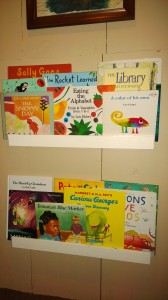
Found 2 unused shelves in the storage room so I decided to use them to display books. Looks even better than I thought! I have it in the playroom but would look great in a child’s room as well. Makes choosing a book even more enticing!
Quick tips for working and playing with children 0-5 years old.
By age three, the brain has formed about 1,000 trillion synapses, which is twice as many as adults. As the synapses in a child’s brain are strengthened through repeated experiences, connections and pathways are formed that structure the way a child learns. If a pathway is not used, it’s eliminated based on the “use it or lose it” principle. Things that a child does only once will have very little influence on brain development. When a connection is used repeatedly in the early years, it becomes permanent.
On May 24th our family happily welcomed Baby M. The past 3 weeks have been wonderful as we watch him get acclimated to the world, our family and especially his big sister Miss H. Every day I am reminded of both how amazing infants are and how important it is to meet their needs . When we meet infants needs and understand them, they learn to trust the world. This trust is the building block for the rest of their learning and development. Continue reading “Some Tips for Understanding and Responding to Newborns and Young Infants”
“Early experiences can determine how proficient a child becomes in his or her native language. Researchers found that when mothers frequently spoke to their infants, their children learned almost 300 more words by age 2 than did their peers whose mothers rarely spoke to them. Furthermore, studies have suggested that mere exposure to language such as listening to the television or to adults talking amongst themselves provides little benefit. Rather infants need to interact directly with other human beings, to hear people talking about what they are seeing and experiencing, in order for them to develop optimal language skills. Unfortunately, many parents are under the mistaken impression that talking to babies is not very important because they are too young to understand what is being said.” (www.zerotothree.org)
Before children are even using writing utensils to attempt to write letters, they are making them with whatever they can find. Here are a few basic items to have in your classroom that children can use to explore the shapes, sizes and structures of letters for the first time: Continue reading “First Explorations with Letters”
My daughter always takes the book covers off her books when she gets them. They just seem to get in the way when she is reading through the book. I also realized that I too take the cover off before reading a book to my students because it is hard to keep it on while holding the book up and turning the pages.
Almost every classroom in the United States has children whose first language is not English. Early Childhood teaching strategies are very appropriate for working with this population of children. Here are a few tips for teachers with ESL children in their classrooms: Continue reading “Basic Tips for ESL/ELL Instruction”
Continue reading “Basic Tips for ESL/ELL Instruction”
ABC Concept books don’t focus on one specific theme for the book, but rather focus on learning the actual letters. The children will primarily learn the alphabet.
ABC Content books have one central theme and each letter represents something from that theme. The children will learn theme-specific vocabulary and the alphabet.
Looking for a fun twist to the traditional alphabet song? Try the Hip Hop Alphabet. You can play the song in the background (the video isn’t needed) and either:
1. Display the alphabet on a large screen or easel and have one child use a pointer to point to each letter as the class sings the song OR
2. Give each child a letter of the alphabet and have them hold it up high and dance as it comes up in the song
Trust me, kids will love it. My undergraduate ECE preservice teachers do too!
Starting Kindergarten is an exciting (and scary) time for parents and children. Here is a great book to read to your child if s/he is heading to Kindergarten this year. It will give them an idea of what to expect when they enter the classroom:
This book can be read before the first day of school in preschool or Kindergarten – it reminds children that their parents are always with them as they go out and explore the world of school: